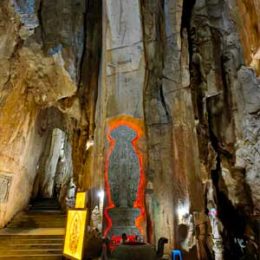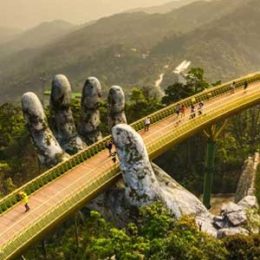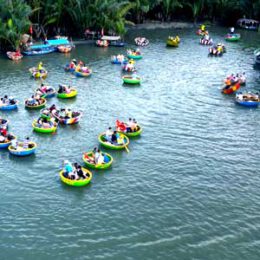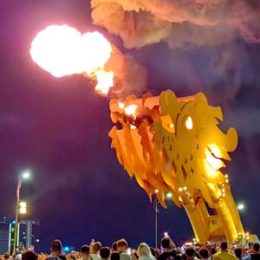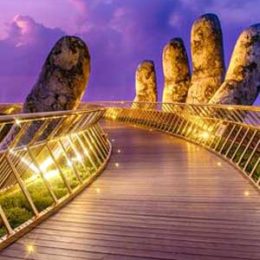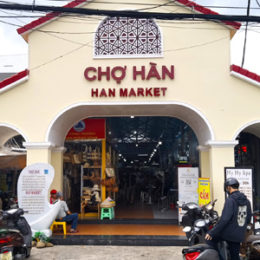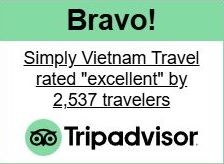FrequentlyAsked Questions
Why Vietnam is worth visiting?
Vietnam, a fascinating country in Southeast Asia, attracts travelers from all over the world with its rich culture, breathtaking landscapes and delicious cuisine. Here are some reasons why Vietnam should be on your travel bucket list.
1. Breathtaking natural landscapes
Vietnam offers an impressive variety of natural landscapes. From the majestic karst cliffs of Halong Bay to the endless rice fields of Sapa, the country’s natural beauty is stunning. The Mekong Delta region, with its floating markets and lush landscapes, is another highlight that captivates visitors. Whether you enjoy hiking, cycling or just enjoying the view, Vietnam has something to offer for everyone.
2. Rich culture and history
Vietnam has a long and colorful history, which is reflected in its numerous temples, pagodas and historical sites. The ancient imperial city of Hue, a UNESCO World Heritage Site, and the impressive ruins of My Son are just a few examples of the country’s cultural treasures. The lively capital Hanoi and the charming town of Hoi An offer insights into Vietnamese culture, traditions and way of life.
Is Vietnam cheap to visit?
Eat & Drink - Tap Water?
Drink:
In Vietnam, it is generally recommended not to drink tap water. It is best to buy bottled water or use a refillable bottle with a filter system. Or enjoy a fresh coconut instead!
Eat:
Vietnamese cuisine is known worldwide for its fresh ingredients and balanced flavors. Dishes like Pho (noodle soup), Banh Mi (sandwich) for less than 2 euros and Goi Cuon (spring rolls) are just a few of the culinary delights you should definitely try. The street stalls and local restaurants offer authentic taste experiences that will tantalize your taste buds. Even in tourist areas, meals in restaurants can often be had for less than 10 euros.
Do I need a Visa for travel to Vietnam?
While some countries such as Germany, France, Spain, Italy, and the UK get 45 days of visa-free entry to Vietnam (find a list here), most other visitors need a visa for their stay. The good news is that this can now be obtained online at the E-Visa-Site, allowing a 90-day stay and multiple entries. Make sure to check your entry requirements well ahead of time.
What language do they speak in Vietnam?
Is Vietnam safe?
Vietnam is a relatively safe destination overall, both for tourists and locals. However, as with any trip, there are some things you should keep in mind to stay safe and enjoy your trip:
Vietnam safety tips:
Traffic:
Traffic in Vietnam, especially in big cities like Hanoi and Ho Chi Minh City, can be chaotic. There are many motorcycles and the traffic often does not follow a fixed order. Be careful when crossing the road. If possible, use means of transport such as taxis or private transport. If you want to ride a motorcycle, prioritize safety — wear a helmet and protective gear and ensure you have comprehensive insurance coverage.
Theft and fraud:
As in many tourist areas, there are opportunities for pickpocketing and fraud in Vietnam. Pay special attention to your valuables in crowds, at popular attractions and at markets.
Be wary of offers that seem too good to be true, such as overpriced tours or services.
Always use trusted currency exchange or ATMs.
Do I need a travel insurance for Vietnam?
Travel and health insurance is a absolute must have for all your travels! It (should) covers everything from medical emergencies to unexpected travel hiccups or even an accident, ensuring you can explore Vietnam worry-free and allowing you to focus on creating incredible memories.
What power plug do they use in Vietnam?
In Vietnam, the standard power plugs are types A, C, D and sometimes F plug types which can also use types B and D.
Type A: This is the flat, two-pronged plug, commonly used in North America. It has two parallel flat pins.
Type C: This is the round, two-pronged plug that is common in Europe. It has two round pins.
Type D: This is a three-pronged plug with round pins, often used in India and some other countries.
Type F: This plug has two round pins and two earth clips on the side, and it is used for devices that require grounding. Also know as “Schuko” plug. Commonly used in Germany, Austria and some other European countries.
The standard voltage in Vietnam is 220V, and the frequency is 50Hz.
If your devices use a different plug type, you will need a plug adapter. Additionally, if your devices are not compatible with 220V (e.g., if they are designed for 110V), you will also need a voltage converter.
Because you never know which plug type will be available, it’s worth purchasing and bringing a universal plug adapter, which will enable you to keep your devices charged throughout your adventures in Vietnam.
Currency and exchange rate?
In Vietnam, the official currency is the Vietnamese đồng (VND), and its symbol is ₫. Banknotes come in various denominations ranging from 200 VND to 500,000 VND. Coins are rarely used in everyday transactions, as they have been mostly phased out.
Currency Exchange:
- Exchange Rates:
- The exchange rate between the Vietnamese đồng and major currencies like the US dollar (USD), Euro (EUR), or others fluctuates daily. As of now (Feb. 2025), 1 USD is approximately 24,000 to 25,000 VND, but it’s essential to check the latest exchange rates for accuracy.
- Where to Exchange Currency:
- Banks: Banks offer a reliable way to exchange foreign currencies, with the added benefit of clear rates and sometimes lower fees. Major banks like Vietcombank and BIDV are common options.
- Gold Shops: They may offer competitive rates, but always double-check their rates. Normaly no fees.
- Currency Exchange Bureaus: These can be found in tourist areas and are often open later than banks. They may offer competitive rates, but always double-check their rates and fees.
- ATMs: You can withdraw Vietnamese đồng from ATMs using international debit/credit cards. Ensure your bank card supports international withdrawals, and check for fees associated with foreign ATM withdrawals.
- Hotels: Some hotels offer currency exchange, but the rates are often less favorable than banks or exchange bureaus.
- Credit and Debit Cards:
- Credit cards (especially Visa and MasterCard) are widely accepted in hotels, restaurants, and larger shops, particularly in big cities like Hanoi, Ho Chi Minh City, or Da Nang.
- Smaller shops or rural areas might prefer cash, so it’s a good idea to always have some VND on hand.
- Tips for Exchanging Currency:
- Avoid exchanging at airports unless absolutely necessary, as the rates tend to be less favorable.
- Compare rates: Exchange rates can vary depending on where you go, so it’s helpful to compare before making a large exchange.
Commonly Accepted Currencies:
- US dollars are widely accepted, especially in major tourist areas. However, you will often receive change in Vietnamese đồng.
- Other foreign currencies like Euros may also be accepted in some places but not as universally as US dollars.
Why do people love Vietnam?
Vietnam is loved by many for a variety of reasons that combine its natural beauty, rich history, vibrant culture, and warm, welcoming people. Here are a few reasons why people fall in love with Vietnam:
- Stunning Natural Beauty:
- Halong Bay: Famous for its emerald waters and thousands of limestone islands, it’s one of the most iconic spots in Vietnam.
- Terraced Rice Fields: Places like Sapa are known for their breathtaking views of terraced rice paddies, especially during the harvest season.
- Beaches: Vietnam is home to beautiful beaches like those in Da Nang, Phu Quoc, and Nha Trang, offering relaxation and water activities.
- National Parks and Mountains: The country is full of lush forests, waterfalls, and diverse ecosystems, making it a paradise for nature lovers.
- Rich Culture and History:
- Ancient Temples and Historical Sites: From the ancient town of Hoi An to the historic Imperial City of Hue, Vietnam is full of historical landmarks and well-preserved heritage sites.
- The War History: Many visitors are drawn to the historical significance of the Vietnam War, with sites like the Cu Chi Tunnels or the War Remnants Museum in Ho Chi Minh City offering poignant insights into the country’s past.
- Traditional Festivals: Tet (Lunar New Year) is the most significant festival, but Vietnam also celebrates many other festivals like Mid-Autumn, which offers a glimpse into local traditions.
- Incredible Cuisine:
- Vietnamese food is known for being fresh, flavorful, and diverse. Whether it’s pho (soup noodles), banh mi (Vietnamese sandwich), spring rolls, or bun cha, the flavors are a harmonious blend of herbs, spices, and textures.
- Street food: The vibrant street food culture is a huge draw for food lovers, offering delicious, affordable meals right on the streets.
- Warm and Friendly People:
- Vietnamese people are known for being friendly and welcoming. Visitors often remark on how the locals are eager to help, share stories, and make their time in Vietnam memorable.
- Hospitality: Whether in bustling cities or remote villages, people are generally very kind and eager to make guests feel at home.
- Affordability:
- Vietnam is very affordable compared to many other countries, especially for travelers from Western nations. Accommodations, food, transportation, and even guided tours are often much cheaper than in other Asian countries.
- Vibrant Cities:
- Hanoi: The capital offers a blend of old-world charm with French colonial architecture and modern developments. The Old Quarter is a fascinating place to explore.
- Ho Chi Minh City: Known for its bustling vibe, skyscrapers, and historical sites, this city has a unique energy that attracts visitors.
- Hoi An: A charming ancient town with picturesque streets, lovely cafes, and a UNESCO World Heritage status.
- Adventure and Activities:
- Vietnam offers plenty of opportunities for adventure, including hiking in Sapa, motorbiking along the Ho Chi Minh Trail, kayaking in Ha Long Bay, and exploring caves in Phong Nha-Kẻ Bàng National Park.
- The countryside and coastal areas provide plenty of outdoor activities like cycling, trekking, and exploring hidden beaches.
- Spiritual and Wellness Experiences:
- Many people visit Vietnam for spiritual exploration, whether it’s through Buddhist temples or wellness retreats. Places like Ninh Binh or Hue offer calm and reflection in nature.
- Unique Traditions:
- Vietnam has a rich tapestry of traditional arts, such as water puppetry, calligraphy, and lacquer painting, all of which are fascinating to learn about and experience.
- The country also has its own unique fashion, handicrafts, and rituals that intrigue those interested in local culture.
- Rapid Development with Preservation of Heritage:
- While Vietnam has rapidly modernized, it has managed to preserve its cultural and natural heritage. Many visitors appreciate the blend of ancient traditions with modern progress.
- Climate Diversity:
- The climate varies from tropical in the south to temperate in the north, allowing for year-round travel, whether you want to explore the cooler mountain regions or enjoy the warmth of the southern beaches.
Vietnam offers a perfect mix of historical intrigue, cultural richness, beautiful landscapes, and modern conveniences that make it a top destination for tourists from around the world.
Is there any particular aspect of Vietnam that interests you the most? Let us know, and we can share more details!
Can I customize my itinerary to suit my needs?
Are there any additonal or hidden costs in our fares? What about tip?
Who is our tour guide?
More than 2,500 reviews with “exellent” on Tripadvisor speak for themselves.
Our tour guides are qualified and certified by government, open-minded and enthusiastic young people who will provide you as a traveler with first-hand knowledge of local history, attractions and culture and will respond to your travel needs. They are also curious about foreign cultures and enjoy cultural exchanges with visitors. They are there to make your trip a success.
Whome to contact if I need help?
You can contact us by email, phone, or our hotline number:
Hotline/Sales Mr. Huy – Phone/Whatsapp/Zalo: (+84) 793 553 385
Customer care Phone/Whatsapp/facebook-messenger/Zalo: (+84)
Email: hi@simplyvietnamtravel.com
List of international airports in Vietnam
Vietnam has several international airports that serve both domestic and international flights. Here’s a list of the main international airports in Vietnam:
- Noi Bai International Airport (HAN) – Hanoi
- Located in the capital city of Vietnam, Hanoi. It handles both domestic and international flights and is one of the busiest airports in the country.
- Tan Son Nhat International Airport (SGN) – Ho Chi Minh City (Saigon)
- Located in the southern economic hub of Vietnam, Ho Chi Minh City. It is the largest and busiest airport in Vietnam, serving numerous international flights.
- Da Nang International Airport (DAD) – Da Nang
- Located in central Vietnam, Da Nang Airport serves as a gateway for tourists visiting central Vietnam, including places like Hoi An and Hue. It also handles international flights.
- Cam Ranh International Airport (CXR) – Nha Trang
- Located near the coastal city of Nha Trang, this airport is mainly used by tourists visiting the area. It has seen growth in international flights in recent years.
- Phu Quoc International Airport (PQC) – Phu Quoc Island
- Located on Phu Quoc Island in the south of Vietnam, this airport has become a popular gateway for tourists visiting the island, with both domestic and international flights.
- Can Tho International Airport (VCA) – Can Tho
- Located in the Mekong Delta region, Can Tho Airport handles both domestic and some international flights, particularly to neighboring countries in Southeast Asia.
These airports are key entry points for travelers coming to Vietnam, with Hanoi and Ho Chi Minh City being the main international hubs.

